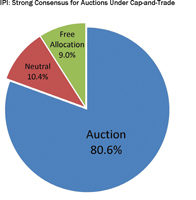IPI Survey: Economists Agree Climate Change Puts Economy at Risk

Respondents agree at a rate of 81 percent that a cap-and-trade system should auction permits to polluters and only 9 percent prefer the United States to give them away for free.
Most expert economists agree that reducing greenhouse gas emissions can help avoid a major economic malfunction, according to a survey conducted by New York University's Institute for Policy Integrity (IPI).
The institute released its findings Wednesday in a report called Economists and Climate Change: Consensus and Open Questions.
More than 84 percent of the top economic experts responding to the poll said that the effects of climate change will create significant risks to important sectors of the United States and global economies. There was near unanimity—98 percent—that a price on carbon will increase incentives for efficiency and innovation.
The survey was sent to 289 economists who published at least one article regarding climate change in the top 25 economic journals over the last 15 years—144 of those responded. By limiting the sample to the economists with the most expertise on climate change, the institute's survey achieved a high response rate and reduced the risk of error. Though the responses to the questionnaire were submitted anonymously, and not every economist responded, the caliber of expertise among the original pool ensures the high quality of the cumulative results.
Respondents to this survey have published work in highly prestigious peer-reviewed journals such as the American Economic Review or Journal of Economic Literature. These journals publish only the highest quality scholarship, including Nobel Prize winning work on the most important economic topics.
New York University School of Law Dean Richard Revesz said, "We can now say that economists agree about the severe effects of climate change on our economy, just as scientists agree about the severe effects of climate change on our planet. There is a clear endorsement for action among the economists who study this issue."
The survey found that:
- More than 94 percent of these expert economists said the United States should commit to emissions reductions through a global treaty;
- 57 percent stated that the United States should commit to reductions "regardless of the actions other countries take;"
- Two percent believe the United States should not reduce emissions under any circumstances.
- 86 percent agreed that climate change will negatively affect the U.S. agricultural sector; and
- 73 percent agreed or strongly agreed that uncertainty, given some risk aversion, increases the value of emissions control measures.
The experts surveyed did not agree on everything. When asked about the specific value of the harm to the economy of greenhouse gases, or what percent of total harm would occur domestically, there was a wide range of estimates, indicating that there is no clear consensus on these questions.
"Reducing our greenhouse gas emissions is an insurance policy against what economists fear are tremendous risks to America’s long-term prosperity. By limiting our carbon emissions soon, we can avoid serious damage to our economy," said Michael Livermore, IPI executive director.
IPI at New York University School of Law is a non-partisan think-tank dedicated to improving the quality of governmental decision making through balanced economic analysis. Revesz and Livermore founded IPI in 2008. Inimai M. Chettiar, a Legal Fellow at IPI, writes for Environmental Protection's Planetshed blog.